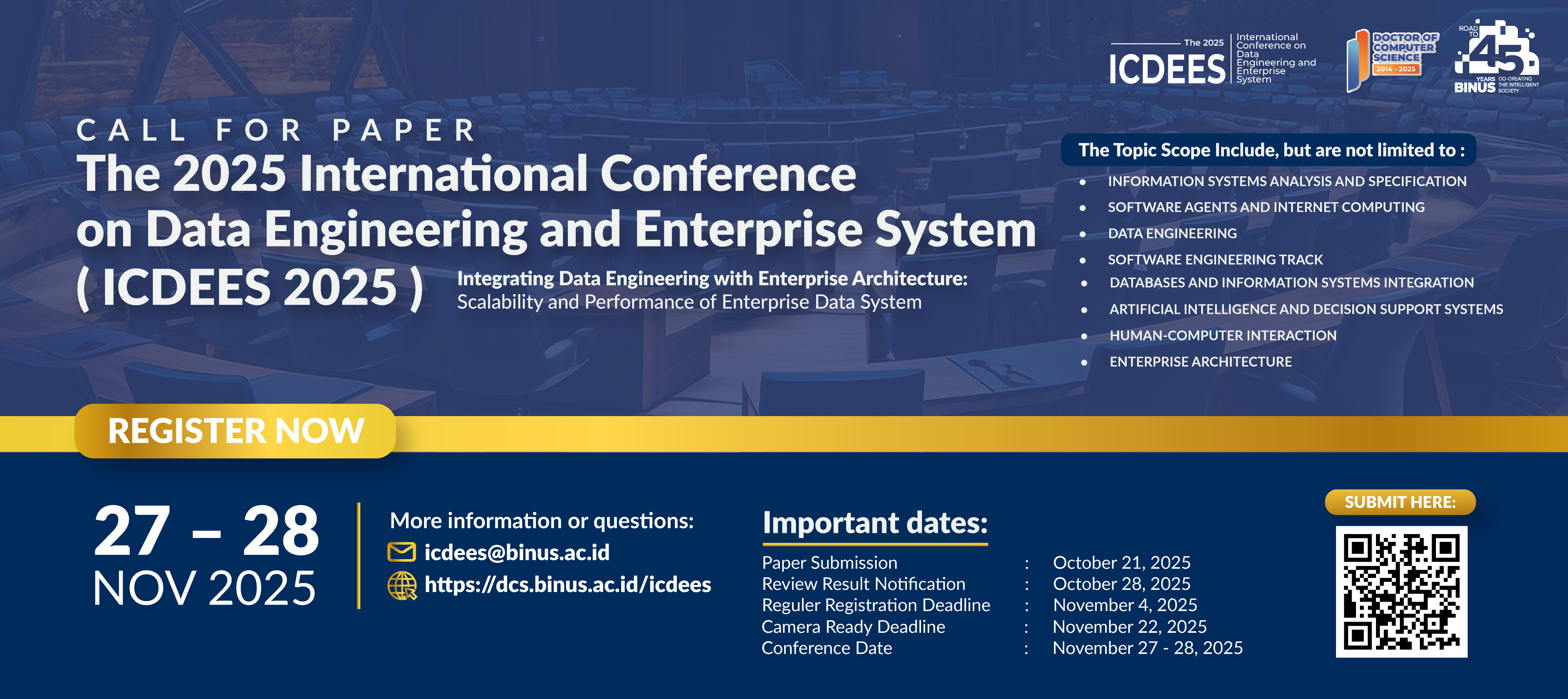The 2025 International Conference on Data Engineering and Enterprise System (ICDEES) 27 – 28 November 2025

The 2025 International Conference on Data Engineering and Enterprise System
(The 2025 ICDEES)
Bandung, 27 – 28 November 2025
The purpose of the 2025 International Conference on Data Engineering and Enterprise System (The 2025 ICDEES) is to bring together researchers, engineers and practitioners interested in the advances and business applications of Data Engineering and Enterprise System.
Eight simultaneous tracks will be held, covering different aspects of Enterprise Information Systems Applications, including Enterprise Database Technology, Systems Integration, Artificial Intelligence, Decision Support Systems, Information Systems Analysis and Specification, Internet Computing, Electronic Commerce, Human Factors and Enterprise Architecture, Data Engineering and Software engineering.
The 2025 ICDEES focuses on real world applications; therefore, authors should highlight the benefits of Information Technology for industry and services. Ideas on how to solve business problems, using IT, will arise from the conference. Papers describing advanced prototypes, systems, tools and techniques and general survey papers indicating future directions are also encouraged. Papers describing original work are invited in any of the areas listed below.
CONFERENCE AREAS
Each of these topic areas is expanded below but the sub-topics list is not exhaustive. Papers may address one or more of the listed sub-topics, although authors should not feel limited by them. Unlisted but related sub-topics are also acceptable, provided they fit in one of the following main topic areas:
- DATABASES AND INFORMATION SYSTEMS INTEGRATION
- ARTIFICIAL INTELLIGENCE AND DECISION SUPPORT SYSTEMS
- INFORMATION SYSTEMS ANALYSIS AND SPECIFICATION
- SOFTWARE AGENTS AND INTERNET COMPUTING
- HUMAN-COMPUTER INTERACTION
- ENTERPRISE ARCHITECTURE
- DATA ENGINEERING
- SOFTWARE ENGINEERING
- DATABASES AND INFORMATION SYSTEMS INTEGRATION
-
- Coupling and Integrating Heterogeneous Data Sources
- Organisational Issues on Systems Integration
- Enterprise Resource Planning
- Databases in the Cloud and Cloud Data Management
- Data Mining and Knowledge Discovery
- Data Warehouses and OLAP
- Performance Evaluation and Benchmarking
- Large Scale Databases
- Non-Relational Databases
- Query Languages and Query Processing
- Distributed Database Systems
- Database Security
- Blockchain Systems
- Big Data, Data Science and Analytics
- Subjective Databases, Data Quality, Curation and Provenance
- ARTIFICIAL INTELLIGENCE AND DECISION SUPPORT SYSTEMS
-
- Decision Support Systems
- Industrial Applications of Artificial Intelligence
- Strategic Decision Support Systems
- Advanced Applications of Neural Network
- Applications of Expert Systems
- Intelligent Agents
- Autonomous Agents & Multi-Agent Systems
- Scheduling and Planning
- Operational Research
- Problem Solving
- Natural Language Interfaces and Systems
- Deep Learning
- Social Intelligence
- Robotics in Business
- Creativity
- Context-aware Pervasive Systems
- INFORMATION SYSTEMS ANALYSIS AND SPECIFICATION
-
- Software Engineering
- Knowledge Management
- Modelling of Distributed Systems
- Ontology Engineering
- Security
- Simulation and Digital Twins for IS
- Requirements Analysis and Management
- Tools, Techniques and Methodologies for System Development
- Model Driven Architectures and Engineering
- Modelling Formalisms, Languages, and Notations (E.G. UML, ER Variants)
- Project Management
- Semiotics in Information Systems
- Software Metrics and Measurement
- Agile Methodologies and Applications
- Dependable Systems for Critical Applications
- Parallel Computing
- Domain Specific and Multi-aspect IS Engineering
- SOFTWARE AGENTS AND INTERNET COMPUTING
-
- Wireless and Mobile Computing
- Ubiquitous Computing
- Interoperability
- Web Services
- Collaborative Computing
- Electronic Commerce
- Profiling and Recommendation Systems
- Internet of Things
- Semantic Web Technologies and Applications
- Distributed Systems
- Trust and Privacy
- Mobile Security Issues and Privacy
- Conversational Agents, ChatBots and LLM for IS
- Cyber-Social Systems
- Emerging Applications of Agent-based Systems
- HUMAN-COMPUTER INTERACTION
-
- HCI on Enterprise Information Systems
- Human Factors
- Guidelines, Principles, Patterns and Standards
- Adaptive and Adaptable User Interfaces
- Interaction Techniques and Devices
- Interface Design
- Emotional and Affective Computing
- Accessibility and Usability
- Collaborative and Social Interaction
- User Experience
- Design and Evaluation
- User Behavior Analysis
- Interaction Models, Virtual Reality / Augmented Reality
- Trust and Transparency
- Machine Learning in HCI
- Ethics, Privacy and Security of HCI
- ENTERPRISE ARCHITECTURE
- Enterprise Engineering
- Models and Frameworks
- Business Modelling and Business Process Management
- Business-IT Allignment
- EA Adoption and Governance
- EA and Organizational Theory and System Development
- EA and Service Oriented Architecture (SOA)
- Methods, Processes and Patterns for EA Development
- Measurements, Metrics and Evaluation of EA Artefacts and Processes
- Architectures and Design Principles for Enterprise Repositories
- Evolution of EA
- Digital Transformation
- EA Tools and Applications
- Enterprise Content Management
- Supply Chain Planning and Management
- Enterprise Architecture and Industry 4.0
- DATA ENGINEERING
-
- Data and Knowledge Modeling
- Information Management Practices
- Knowledge-Based Management Systems
- Knowledge Discovery in Data
- Data/Process Mining
- Semantic Web Technology
- Web Analytics
- Business Intelligence
- Ontology
- Data Visualization & Analytics
- Data Science
- Database Technology
- Spatial and Temporal Database
- Distributed Database
- Open Data
- Big Data
- Data and Information Security
- SOFTWARE ENGINEERING TRACK
-
- Software Engineering Process & Lifecycle
- Software Analysis and Design Methods
- Software Quality Assurances
- Open Source Software
- Software Measurement
- Requirements Engineering
- Agile Methodology
- Extreme Programming
- Empirical Software Engineering
- Software Engineering Education
- Software Project Management
- Software Industry
- Software Product Line
- Security Software and System
- Software Architecture
- Cloud Computing
- Software Engineering Tools
- Software Technologies
- SOA (Service Oriented Architecture)
- Business Process Management System
- Ultra Large-Scale System
- Artificial Intelligence for Software Engineering

